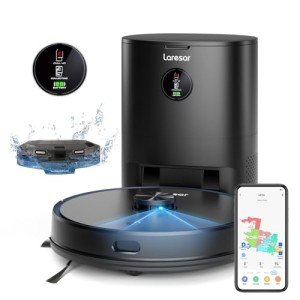10 Things We Love About Robotic Vacuum
The Rise of the Robotic Vacuum Cleaner: Revolutionizing Home Cleaning
In the realm of household appliances, robotic vacuum cleaners have emerged as one of the most significant innovations in the last few years. These autonomous devices provide convenience and efficiency, enabling house owners to maintain cleaner home without the drudgery of manual vacuuming. This short article checks out the evolution, performance, advantages, and considerations concerning robotic vacuum, along with providing insights through data tables and regularly asked questions.
A Brief History of Robotic Vacuum Cleaners
The journey of robotic vacuum cleaners began in the late 20th century, with early prototypes failing to make substantial strides in homes. However, improvements in innovation caused the introduction of more refined designs in the early 2000s. Companies such as iRobot and Neato played a pivotal role in popularizing these wise home devices.
Evolution Timeline of Robotic Vacuum Cleaners
Year
Turning point
1996
Release of the first robotic vacuum, the ELECTROLUX TRINITY
2002
iRobot presents the Roomba, a widely recognized design
2012
Introduction of designs with sophisticated mapping abilities
2020
Incorporation of expert system for improved navigation
2023
Models with incorporated wise home connection and app control
How Robotic Vacuum Cleaners Work
Robotic vacuum cleaners make use of a combination of sensing units, mapping innovation, and artificial intelligence to browse and clean various surface areas effectively. Here's a simplified introduction of their core performance:
Sensors: Equipped with infrared or ultrasonic sensing units, these gadgets can detect obstacles, cliffs, and dirt, allowing them to navigate through spaces without crashing into furniture or toppling down stairs.
Navigation: Most modern-day robotic vacuum integrate clever mapping technologies, allowing them to map out the home layout and optimize cleaning paths.
Cleaning Mechanism: Using brushes and suction power, robotic vacuums gather dirt, dust, and particles from various floor types, including carpets and hardwood.
Charging and Cleaning Schedules: After finishing a cleaning session or when their battery runs low, these robotics automatically return to their charging dock. Users can set cleaning schedules by means of smartphone apps, assisting keep a tidy home effortlessly.
Benefits of Robotic Vacuum Cleaners
Robotic vacuum cleaners provide many benefits over conventional vacuuming techniques. Here are some of the essential advantages:
- Time-Saving: Automated cleaning suggests property owners can designate their time to other activities.
- Convenience: Scheduling cleaning sessions permits a tidy home without manual intervention.
- Thorough Cleaning: Many robotic designs include specialized brushes to take on animal hair and offer deep cleaning on carpets and rugs.
- Smart Home Integration: Many systems work with smart home systems, providing voice control and remote management.
Popular Features in Robotic Vacuum Cleaners
Feature
Description
Mapping Technology
Develops a digital map of the cleaning location
Mobile App Control
Supplies users the ability to start/stop or schedule cleaning sessions remotely
Self-Cleaning
Some designs have docking stations that can self-empty dust bins
Advanced Sensors
Finds dirt better and browses better
Voice Control
Compatible with virtual assistants like Alexa and Google Assistant
Considerations Before Purchasing a Robotic Vacuum Cleaner
While robotic vacuum cleaners provide many benefits, prospective purchasers ought to think about a few factors before buying. Here are some indicate remember:
Key Factors to Evaluate
Floor Type: Certain models perform better on carpets while others excel on tough floorings. Purchasers must select versatile vacuums if they have actually blended floor covering.
Battery Life: Longer battery life allows for extended cleaning sessions. Search for designs that can cover big locations without regular charging.
Dustbin Capacity: A larger dustbin decreases the frequency of clearing, making cleaning less labor-intensive.
Noise Level: Some models run quietly, which is perfect for homes with children or sensitive pets.
Maintenance: Users ought to likewise evaluate the ease of maintenance, particularly for filters and brushes.
Prospective Drawbacks
- Price: Robotic vacuum can be substantially more costly than standard vacuums.
- Efficiency: While they efficiently maintain cleanliness, they might not always match the deep cleaning efficacy of manual vacuums.
- Barrier Navigation: Some designs might deal with particular kinds of furniture or messy locations, possibly leading to missed spots.
FAQs About Robotic Vacuum Cleaners
Q1: How frequently should I run my robotic vacuum cleaner?
A1: It generally depends upon your home. For homes with pets or high foot traffic, running it day-to-day is helpful. In robot vacuum and mop , you may discover every other day is adequate.
Q2: Can robotic vacuum cleaners deal with carpets?
A2: Most robotic vacuums can clean up carpets; however, functions such as suction power and brush design can significantly affect their efficiency on different carpet types.
Q3: Are robotic vacuum cleaners helpful for animal hair?
A3: Yes, numerous models are particularly developed to select up pet hair and feature specialized brushes to prevent tangling.
Q4: What occurs when the vacuum runs out of battery?
A4: Most robotic vacuums instantly go back to their charging dock when their battery is low, guaranteeing they are all set for the next cleaning session.
Q5: Can I manage my robotic vacuum with my smart device?
A5: Yes, lots of robotic vacuum come equipped with mobile apps that allow you to set up cleansings, display development, and receive notices.
Robotic vacuum cleaners represent a significant advancement in home-cleaning innovation, merging benefit with effectiveness to fundamentally alter how homes preserve tidiness. As developments continue to emerge, these devices are ending up being progressively capable, offering users not only time-saving solutions however also enhanced cleaning experiences. As the marketplace continues to grow, potential buyers are motivated to weigh the functions, benefits, and factors to consider carefully to find the very best model customized to their special needs. Whether it's a hectic family, an animal fan, or someone looking for automation in their cleaning routine, there's most likely a robotic vacuum cleaner that fits the costs.
